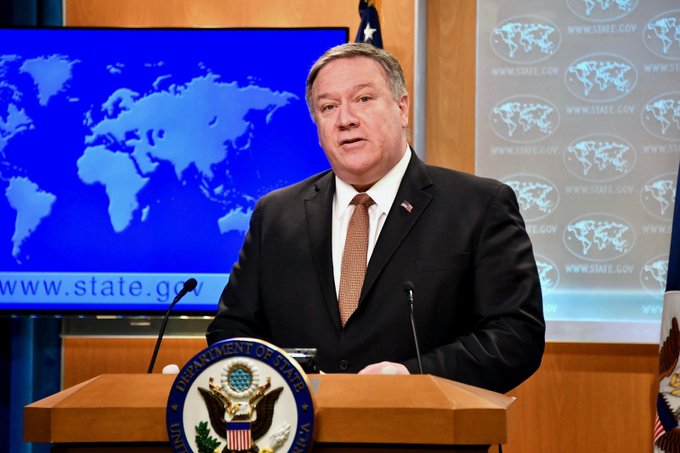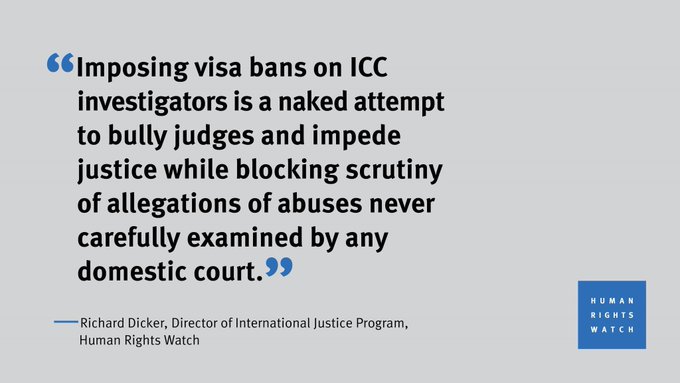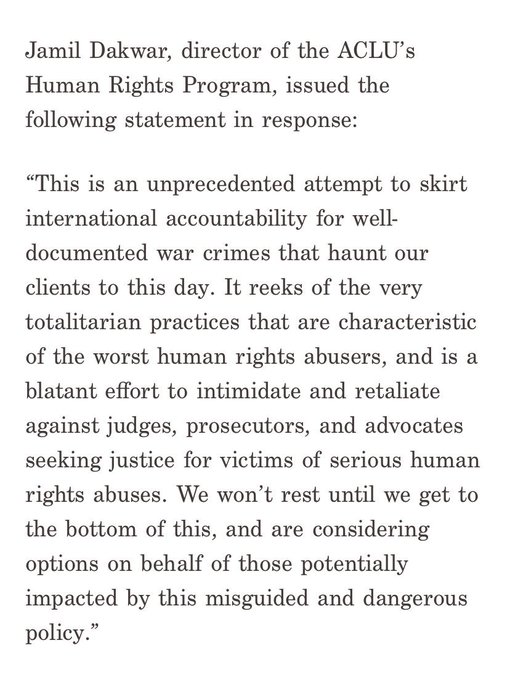US BARS ENTRY TO ICC INVESTIGATORS, SAYS ‘ATTACKING AMERICA’S RULE OF LAW’

The United States announced on Friday it would deny visas to members of the International Criminal Court involved in investigating alleged war crimes from US troops in Afghanistan or in other countries.
Secretary of State Mike Pompeo said Washington was prepared to take further steps, including economic sanctions, if the war crimes court goes ahead with any probes of US or allied personnel.
“The ICC is attacking America’s rule of law,” Pompeo told reporters. “It’s not too late for the court to change course and we urge that it do so immediately.”
The United States has never joined the ICC, where a prosecutor, Fatou Bensouda, asked judges in November 2017 for authorization to open an investigation into alleged war crimes in Afghanistan.
Pompeo’s announcement of visa restrictions was the first concrete action taken by the US against the ICC since the White House threatened reprisals against the Hague-based body in September of last year.
“I’m announcing a policy of US visa restrictions on those individuals directly responsible for any ICC investigation of US personnel,” the secretary of state said.
This would include anyone who takes, or has taken, action to request or further an investigation, he told reporters.
“If you’re responsible for the proposed ICC investigation of US personnel in connection with the situation in Afghanistan you should not assume that you still have, or will get, a visa or that you will be permitted to enter the United States,” Pompeo added.
The secretary of state said visas could also be withheld from ICC personnel involved in conducting probes of US allies, specifically Israel.
“These visa restrictions may also be used to deter ICC efforts to pursue allied personnel, including Israelis, without allies’ consent,” he said.
Pompeo said “implementation” of the policy has already begun but he did not provide any details, citing confidentiality surrounding visa applications.
“These visa restrictions will not be the end of our efforts,” Pompeo said. “We’re prepared to take additional steps, including economic sanctions, if the ICC does not change its course.”
‘Politically motivated prosecutions’
The secretary of state said the US had declined to join the ICC “because of its broad unaccountable prosecutorial powers” and the threat it proposes to American national sovereignty.
“We are determined to protect American and allied civilian personnel from living in fear of unjust prosecution for actions taken to defend our great nation,” he said.
“We feared that the court could eventually pursue politically motivated prosecutions of Americans,” he said, “and our fears were warranted.”
Pompeo said the US government was obliged to protect its citizens and procedures were already in place to deal with members of the US armed forces who engage in misconduct.
“When US service members fail to adhere to our strict code of military conduct they are reprimanded, courtmartialed and sentenced, if that’s what’s deserved,” he said.
“The US government, where possible, takes legal action against those responsible for international crimes,” he added, noting that it has supported prosecution of war crimes in Rwanda, the former Yugoslavia and elsewhere.
The ICC and human rights groups reacted swiftly to Pompeo’s remarks.
“The ICC, as a court of law, will continue to do its independent work, undeterred, in accordance with its mandate and the overarching principle of the rule of law,” the ICC said.
Richard Dicker, international justice director at Human Rights Watch, said the US move “is a naked attempt to bully judges and impede justice for victims in Afghanistan” and “blatant contempt for the rule of law.”
James Goldston, executive director of the Open Society Justice Initiative, said Pompeo’s remarks reflected the administration’s view that international law matters “only when it is aligned with US national interests.”
“Attacking international judicial actors for doing their jobs undermines global efforts to hold to account those most responsible for atrocity crimes such as torture and mass murder,” Goldston said.
The ICC was established in 2002 under the Rome Statute and joined by 123 countries.
But ICC membership was never ratified by the US Senate and the “America First” administration of President Donald Trump has been a particularly virulent opponent.
John Bolton harshly condemned the ICC in one of his first speeches after becoming Trump’s national security advisor in September.
“We will not cooperate with the ICC,” Bolton said. “And we certainly will not join the ICC. We will let the ICC die on its own.”
(AFP)























